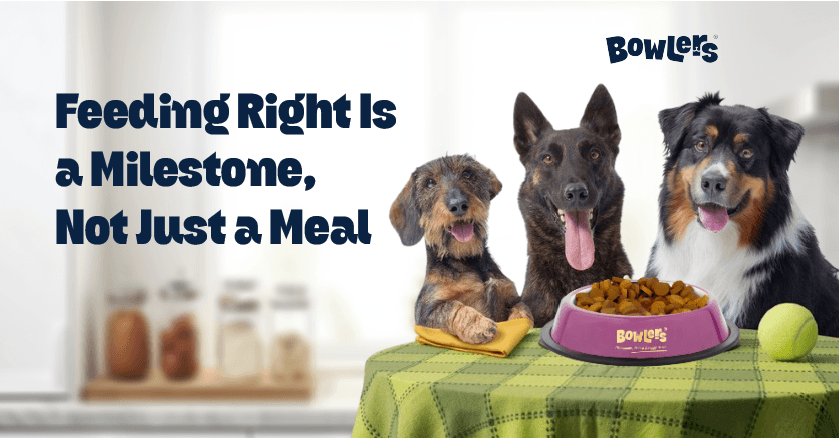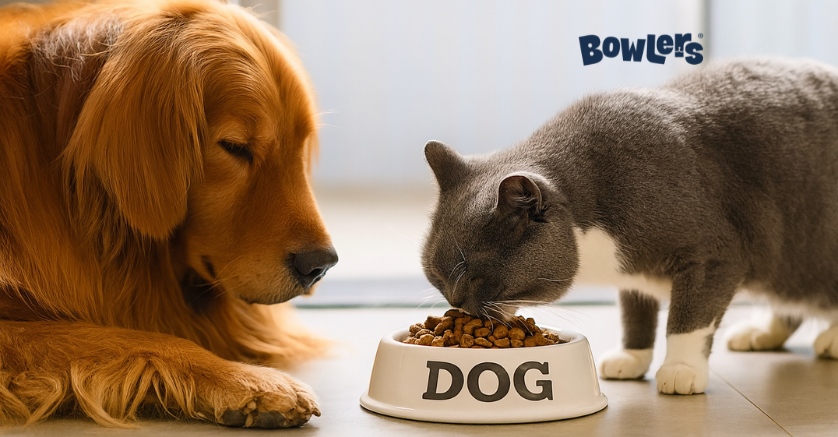Switching Too Soon: The Risks of Moving Puppies to Adult Dog Food Early

Table of contents
- Why Puppies Need a Different Diet
- What Happens If You Feed Adult Food Too Early?
- Knowing the Right Time to Move to Adult Food
- Making the Transition Easier on Your Puppy
- Mistakes to Avoid
- FAQs: Early Switching from Puppy to Adult Dog Food
- 1.Can early switching affect my puppy’s energy levels?
- 2. Can I feed adult food to puppies every day?
- 3. How do I know my puppy is ready for adult food?
- 4. Can early switching cause bone problems?
- 5. Is it safe to mix puppy and adult food?
Many pet parents are eager to see their puppy “grow up” and assume that switching to adult dog food early is a natural step. However, rushing this transition can actually backfire.
Puppies have very different nutritional needs compared to adult dogs, and feeding the wrong diet at the wrong stage can lead to long-term health issues affecting growth, immunity, and overall development.
This guide explains why feeding adult dog food too soon is risky, the problems it can cause, and how to identify the right time to transition. With the right timing and nutrition, you can support healthy growth and set your puppy up for a strong, happy adulthood.
Why Puppies Need a Different Diet
Puppy food isn’t just adult kibble in smaller pieces, it is designed with growing bodies in mind. Compared to adult formulas, puppy-specific diets include:
- Extra protein to build muscle mass and tissue
- Higher fat content to fuel active play and rapid development
- Calcium and phosphorus to support strong bones and teeth
- DHA and fatty acids for cognitive and vision growth
Adult dog food, on the other hand, focuses on maintenance, not growth. Feeding it too early can mean your puppy misses out on essential building blocks during their most critical stage of life.hing too early means your puppy may miss out on crucial nutrients.
What Happens If You Feed Adult Food Too Early?
Giving adult food to puppies before they’re ready can create several problems. The impact may not be obvious right away but can show up later in their health, growth, and energy.
1. Stunted Growth and Weak Bones
Without enough protein, calcium, and phosphorus, puppies may develop fragile bones or poor muscle tone. This is especially risky for larger breeds that already face joint stress.
2. Weaker Immune System
Puppies rely on specific vitamins and antioxidants in their food to build strong immunity. Adult formulas provide less of these, leaving puppies more prone to illness.
3. Low Energy and Poor Weight Gain
Since adult food has fewer calories, a puppy might not get the energy needed for their active lifestyle. This can result in lethargy, slow weight gain, or an undernourished look.
4. Digestive Upset
A puppy’s digestive system is still developing. Sudden changes especially to a formula not designed for them can trigger diarrhea, vomiting, or refusal to eat.
Knowing the Right Time to Move to Adult Food
There’s no single “perfect age” when every puppy should switch to adult food. The right moment depends on how quickly your dog matures, which can vary by size and breed. Smaller dogs often reach adulthood sooner, while larger breeds may take much longer to fully grow.
Rather than focusing only on months, pay attention to your puppy’s growth patterns. Signs such as their weight stabilizing, no longer having the endless hunger of early puppyhood, and their body beginning to look more filled out and less lanky usually indicate they’re ready for adult nutrition. Since every pup develops at a different pace, your veterinarian is the best guide to confirm when your dog is truly ready to make the switch.
Making the Transition Easier on Your Puppy
Even if you wait for the right stage to introduce adult food, a sudden switch can still upset your puppy’s digestion. Instead of replacing their food all at once, gradually increase the proportion of adult food while reducing the puppy formula. This slow adjustment helps their stomach adapt without stress.
During this period, observe your dog’s stool quality, appetite, and energy levels. Any signs of diarrhea, vomiting, or unusual tiredness indicate that the transition is moving too quickly. In such cases, pause, slow down the process, and consult your vet to avoid long-term digestive issues.
Mistakes to Avoid
Many dog owners make the same errors when changing food. Watch out for these:
- Switching based on age alone – breed size and growth speed matter more than birthdays.
- Abruptly changing diets – always mix gradually.
- Assuming all adult food is equal – choose a high-quality, well-balanced formula.
- Keeping them on puppy food too long – overfeeding calories can lead to obesity.
Feeding adult food too soon may seem harmless, but it can compromise your puppy’s growth, immunity, and energy. Instead, follow breed-specific timelines, pay attention to growth signs, and transition gradually with your vet’s guidance. A well-timed switch sets the foundation for a healthier adulthood.
FAQs: Early Switching from Puppy to Adult Dog Food
1.Can early switching affect my puppy’s energy levels?
Yes, puppies on adult food too soon may feel less energetic because they miss out on the extra calories and nutrients needed for growth.
2. Can I feed adult food to puppies every day?
Not recommended. Puppies require higher protein, fat, and calcium for growth.
3. How do I know my puppy is ready for adult food?
Signs include slowed growth, steady appetite, and your vet’s approval.
4. Can early switching cause bone problems?
Yes. Lack of calcium and phosphorus during development may weaken bones and joints.
5. Is it safe to mix puppy and adult food?
Yes, but only during the transition stage. Mixing long-term can create an imbalance


